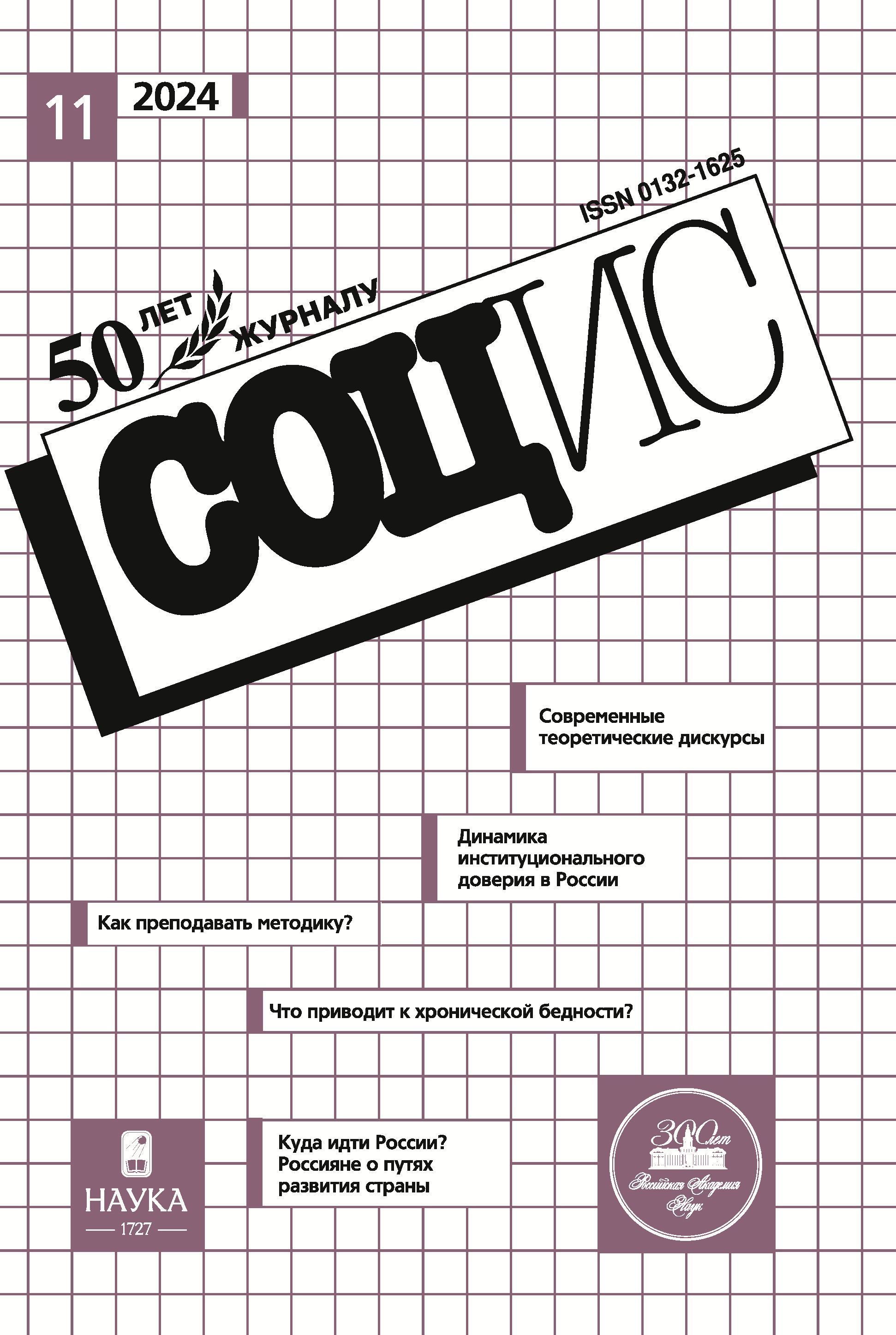Persistent poverty in Russia: a qualitative study
- Authors: Nazarbaeva E.A.1, Khalina N.V.1, Pishnyak A.I.1
-
Affiliations:
- HSE University
- Issue: No 11 (2024)
- Pages: 48-58
- Section: SOCIAL STRUCTURE. SOCIAL POLICY
- URL: https://rjmseer.com/0132-1625/article/view/673683
- DOI: https://doi.org/10.31857/S0132162524110042
- ID: 673683
Cite item
Abstract
The article is devoted to the analyses of persistent poverty in comparison with transitory one. A huge number of studies is already done in this area, however, applying primarily quantitative methodology. The objective of our study is to explore the persistent poverty using qualitative methods. As the literature review demonstrates that families with children are one of the main categories at risk of chronic poverty, the study is focused on this category. Using the data of focus-group discussions (FGDs) conducted in summer 2023 with both persistent poor and those with transitory poverty experiences, we argue that chronically poor do not describe themselves as poor. Moreover, they underestimate duration of living below the poverty line and the risks of their position arguing that they are able to improve it (primarily in terms of income). During the FGDs the study participants discussed the cases of the other poor and their capability to quit poverty as well as their own capabilities. Persistently poor population is able to formulate various strategies to overcome poverty for others (like activities in labor market, applying for social benefits etc.), however, they are not ready to use the same steps for themselves. They appeal to their negative experience at the labor market, necessity to spend much time with children and being not ready to radically change their habits.
Full Text
About the authors
Elena A. Nazarbaeva
HSE University
Author for correspondence.
Email: enazarbaeva@hse.ru
Research Fellow, Centre for Studies of Income and Living Standards
Russian Federation, MoscowNatalia V. Khalina
HSE University
Email: nkhalina@hse.ru
Research Fellow, Centre for Studies of Income and Living Standards
Russian Federation, MoscowAlina I. Pishnyak
HSE University
Email: apishniak@hse.ru
Cand. Sci. (Sociol.), Center Director, Centre for Studies of Income and Living Standards
Russian Federation, MoscowReferences
- Abanokova K., Dang H. (2021) Poverty in Russia: A Bird’s-Eye View of Trends and Dynamics in the Past Quarter of Century. IZA Discussion Paper. No. 14544. 2021. URL: https://docs.iza.org/dp14544.pdf (accessed: 25.10.2024).
- Andriopoulou E., Tsakloglou P. (2011) The Determinants of Poverty Transitions in Europe and the Role of Duration Dependence. IZA Discussion Paper. No. 5692. 2011. URL: https://docs.iza.org/dp5692.pdf (accessed 25.10.2024).
- Carter M. R., Barrett C. B. (2006) The economics of poverty traps and persistent poverty: An asset-based approach. Journal of Development Studies. Vol. 42. No. 2: 178–199.
- Chernina N. V. (1994) Poverty as a social phenomenon in Russian society. Sotsiologicheskie issledovaniya [Sociological Studies]. No. 3: 54–61. (In Russ.)
- Fouarge D., Layte R. (2005) Welfare Regimes and Poverty Dynamics: The Duration and Recurrence of Poverty Spells in Europe. Journal of Social Policy. No. 34: 407–426.
- Howe G., McKay A. (2007) Combining quantitative and qualitative methods in assessing chronic poverty: The case of Rwanda. World Development. Vol. 35. No. 2: 197–211.
- Hulme D., McKay A. (2013) Identifying and measuring chronic poverty: Beyond monetary measures? In: Many Dimensions of poverty. Ed. by N. Kakwani, J. Silber. UK: Palgrave Macmillan UK.
- Laderchi C. R., Saith R., Stewart F. (2003) Does it matter that we do not agree on the definition of poverty? A comparison of four approaches. Oxford development studies. Vol. 31. No. 3: 243–274.
- Lezhnina Yu.P. (2014) Social demographic specifics of poverty in Russian Federation. Sotsiologicheskie issledovaniya [Sociological Studies]. No. 1: 20–28. (In Russ.)
- Maleva T. M., Grishina E. E., Burdyak A. Y. (2020) Chronic poverty: What affects its level and severity? Voprosy ekonomiki [Economic Questions]. No. 12: 24–40. (In Russ.)
- Mckay A., Lawson D. (2003) Assessing the Extent and Nature of Chronic Poverty in Low Income Countries: Issues and Evidence. World Development. No. 31(3): 425–439.
- Ovcharova L. (2012) Theoretical and methodological issues of defining and measuring poverty. SPERO. Social’naja politika: jekspertiza, rekomendacii, obzory [SPERO. Social policy: Expertise, Recommendations, Overviews]. No. 16: 15–38. (In Russ.)
- Pishnyak A., Khalina N. et al. (2021) The level and the profile of persistent poverty in Russia. Zhurnal Novoj jekonomicheskoj associacii [Journal of the New Economic Association]. Vol. 50(2): 56–73. (In Russ.)
- Slobodenyuk E., Tikhоnova N. (2014). The heterogeneity of poverty in Russia through the prism of deprivation and absolute approaches. Obshhestvennye nauki i sovremennost’ [Social Sciences and Contemporary World]. No. 1: 36–49. (In Russ.)
- Slobodenyuk E. D. (2014) Institutional factors of chronic poverty formation in modern Russia. Zhurnal institucional’nyh issledovanij [Journal of institutional studies]. No. 3: 146–159. (In Russ.)
- Spryskov D. S. (2000) Persistent Poverty in Russia. Moscow: New Economic School.
- State social policy and survival strategies of households. (2023) Ed. by O. I. Shkaratan. Moscow: GU VSHE. (In Russ.)
- Tikhonova N.Ye. (2003) Urban poverty phenomenon in contemporary Russia. Moscow: Letniy sad. (In Russ.)
- Tikhonova N.Ye. (2014) Poverty phenomenon in contemporary Russia. Sotsiologicheskie issledovaniya [Sociological Studies]. No. 1: 7–19. (In Russ.)
- World Bank. Russia – Targeting and the longer-term poor. (1999) Vol. 1: Main report (English). URL: https://documents.worldbank.org/en/publication/documents-reports/documentdetail/713851468777993685/main-report (accessed 25.10.2024).
- Yaroshenko S. (2010) “New poverty” in Russia after the socialism. Laboratorium. No. 2: 221–251. (In Russ.)
- You J. (2010) Evaluating poverty duration and transition: A spell-approach to rural China. BWPI Working Paper 134. URL: https://hummedia.manchester.ac.uk/institutes/gdi/publications/workingpapers/bwpi/bwpi-wp-13410.pdf (accessed 25.10.2024).
Supplementary files










